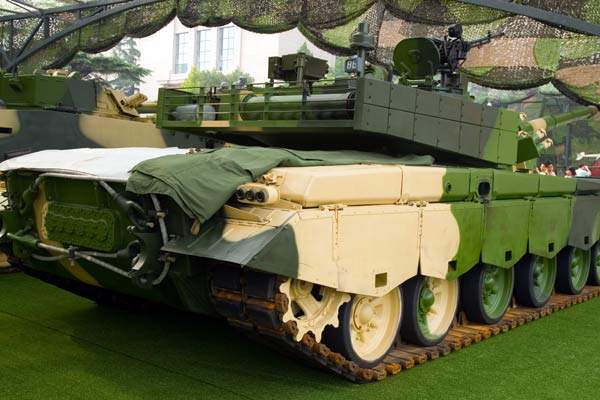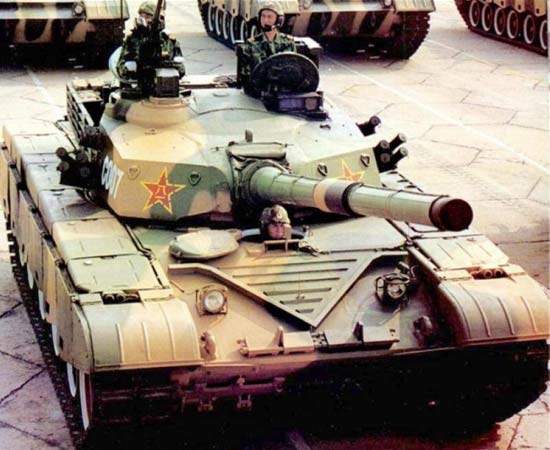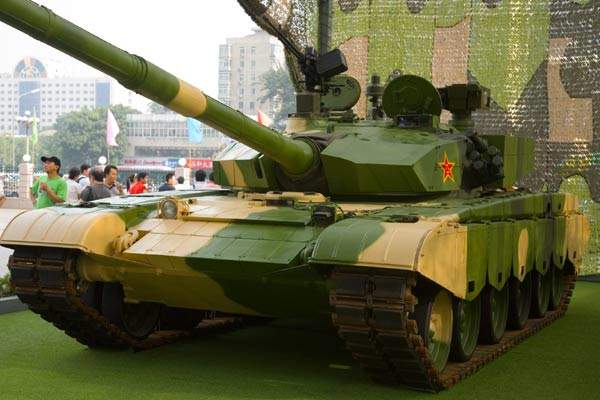The ZTZ99 main battle tank (MBT) entered service in 2001. It is also called the Type 99 and the Chinese industrial code isWZ123. ZTZ99 is a successor to Type 98 G, which in turn was a successor to Type 98. Manufactured for the People’s Liberation Army (PLA) by China Northern Industries Corporation (CNGC) or Norinco, the ZTZ99 MBT is considered one of the 12 best tanks in the world.
ZTZ99 is a third-generation battle tank and, due to its high cost (unit cost approximately $2,500,000), it was built in small numbers.
In comparison to older Chinese-made tanks, the MBT has improved capabilities in terms of protection, power and mobility. It has a crew of three.
ZTZ99 was made to compete with western tanks, while its technology is used to improvise the more economical ZTZ 96. Regiments in China’s Shenyang and Beijing military areas currently deploy the MBT ZTZ99.
ZTZ99 main battle tank programme
ZTZ99 is a by-product of PLA’s extensive R&D effort. The third-generation MBT programme began in 1970. PLA entered into a contract with Norinco in the year 1989 for the development of the tank. A Russian 125mm gun with autoloader built in 1990 was the earliest known prototype called Type 90. After careful observation of the Gulf war, PLA realized the ineptness in design in comparison to the Western MBTs.
Several improvisations led to the revised design Type 98. It featured a T-72 hull which was 1m longer. The MBT was unveiled during the Chinese National Day parade on October 1 1999.
Type 99 main battle tank design
Type 99 is similar, in a lot of specifications, to the M1A1 tank and the Western Leopard 2. Western influences have been noticed in the angular welded turret design.
The MBT carries 9M119 Refleks. This anti-tank guided missile of Russian origin is produced in China under a local licence. Its Nato (North Atlantic Treaty Organisation) codename is AT-11 Sniper. The diesel engine is turbo charged and uses German technology, and the tank is liquid cooled.
Explosive reaction armour (ERA) units were added to the turret and hull’s front portion. This contains approximately 1,000mm to1,200mm of steel armour. The Type 99 has a 1,500HP diesel engine while the ZTZ98 uses a 1,200HP diesel engine. The tank layout has three compartments. Frontage has the driving compartment; the middle serves as fighting compartment and the engine is placed at the rear end.
The driver sits in the hull and in front of the turret, while the gunner sits on the left side of the turret. Tank commander takes up the turret’s right side and operates the 12.7 mm anti-aircraft machine gun. The gun is mounted on turret roof. An over-pressure collective NBC protection and a fully automatic fire suppression system protect the crew.
The hull and turret are built of welded steel armour. The modular design allows damaged sections to be easily replaced. New upgrades can be placed giving it increased service life. The turret’s inside design layout is modelled on Russian style. The MBT closely resembles the Russian 2A46M autoloader’s design. There is provision for extra ammunition in the fighting compartment. This makes the MBT highly susceptible to fire once penetrated. The MBT requires a bustle autoloader, on which production has not been started yet.
Mission variants
Type 99A is a predecessor to the Type 99A1 and successor to the Type 99G MBT. Built by China Northern Industries Group Corporation (CNGC), the ZTZ99G has newly designed features and active protection system (APS). The new tank is larger with an autonomous commander thermal imaging viewer. The electro-optical countermeasures devices have been replaced by a new design.
The laser receiver on the original MBT has been remodelled into a box-shape. This is installed by the commander hatch. Type 99 A1 is deployed by PLA and is in service now. The turret top of Type 99A1 has been reshaped by thickening it. The turret’s height has been changed to make room for the tank commander and gunner and for protection.
The armour packages are in the front and side areas and the ERA panels have been extended. Other distinct detail is upgrade in terms of targeting computers.
Type 99A2, the most advanced variant, is undergoing trials and will enter service after 2009. Significant improvements of Type 99A2 make it a new tank altogether. Some of the upgrades are an information terminal and aiming system. It also includes bigger turret with a bigger tail chamber and arrow-shaped armour. It has a periscope for the commander and an integrated propulsion system with an active protection system which is set on turret .
Propulsion
The tank is powered by a 1,500HP diesel engine, derived from the German MB871ka501 diesel technology. The power-to-weight ratio stands at approximately 27.78, and the tank’s battle weight is 54t. The engine propels the tank with an on road speed of 80km/h and cross country speed of 65km/h. It takes only 12 seconds to climb acceleration speeds from 0 to 32 km/h. One reverse gear and seven forward gears assist the transmission.
Armament and ammunition
Dual-axis stabilised 125mm / 50-calibre ZPT98 smoothbore gun equipped with a fume extractor, a thermal sleeve and an autoloader comprise the MBT’s armaments. The gun is electronically or manually controlled and barrel is replaceable in one hour.
Gun loading is mechanical and can fire 8 rounds per minute with autoloader & 1 to 2 rounds per minute manually. The tank gun fires separate loading projectiles. Other ammunition includes high-explosive fragmentation (HE-FRAG), high explosive anti-tank (HEAT) and armour-piercing fin-stabilised discarding sabots (APFSDS).
Weapon systems
Weapon systems for the 125mm tank gun is the APFSDS round. It has a 30:1 length / calibre tungsten alloy penetrator. Muzzle velocity of the round is 1,780m a second and can penetrate 850mm steel armour from a distance of 2,000m. The tank can fire rounds of depleted uranium (DU), APFSDSs and kinetic energy penetrator. These can penetrate 960mm steel armour that is located 2,000m far.
The Type 99 also carries laser-guided anti-tank missiles, which fires from the main gun. Semi-automatic laser beam-riding guidance is employed by the missile. The missile’s effective range varies between 100m and 4,000m.
The missile system has been aimed at engaging ERA fitted tanks and low-flying air targets, at a maximum range of 5km. Four missile rounds are carried inside the vehicle.
A 12.7mm anti-aircraft machine gun is mounted on the commander’s cupola; with an elevation of 4° to 75° with optical sight 1,500m is the maximum range against airborne target. The tank maintains a rate of fire ranging from 80 to 100 rounds a minute and carries up to 300 rounds. A fixed-mount coaxial 7.62mm machine gun on the right side of the main gun, can fire up to 2,000 rounds.
Two five-barrelled smoke grenade launchers are on each side of the turret. By injecting diesel fuel into the engine’s exhaust, additional smoke is also generated.
Countermeasures
Located on the turret roof is the electro-optical countermeasures suite just behind the gunners hatch. The system has laser warning receiver (LWR) with a box-shape active laser self-defence weapon (LSDW). High-powered laser can be employed so that the enemy weapon’s gunner and optics can be attacked. The powerful LSDW is capable of disrupting the enemy’s missile laser / infrared guidance signal. It can also disable the enemy’s optics and can damage the enemy gunner’s eyesight.
Fire Control
Ballistic computer, laser range-finder, thermal barrel sleeve, wind sensor and muzzle reference system give the tank fire accuracy.
Dual axis stabilization helps in firing effectively while the tank is in motion. The commander can have a 360° sight using six periscopes and the gunner has roof-mounted stabilised sights. These are fitted with thermal channels with auto tracker facility. The commander can view the gunner’s thermal sight. This helps the commander fire the main gun. The thermal imaging system (TIS) with cooled detector uses SPRITE (signal processing in the element) technology.
It has a magnification of ×11.4 narrow field of view and ×5 wide field of view. The Type 99 also has an information processing system on-board.
Communications
The tank is outfitted with HF/VHF radio and a laser communication device. The device is placed over the mast on the turret roof just behind the commander’s hatch. It assists in line of sight (LOS) transmission of information including encrypted voice, text and data and acts as identification friend or foe (IFF). The system can be traversed around 360° and 10° to 45° elevation. Its effective range is 3,600m. The tank can also be equipped with a GLONSS / GPS receiver, which can assist in navigation and positioning.







